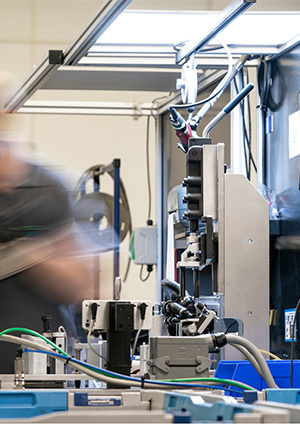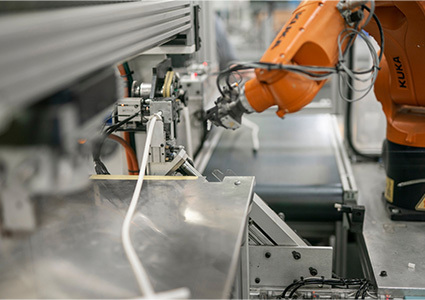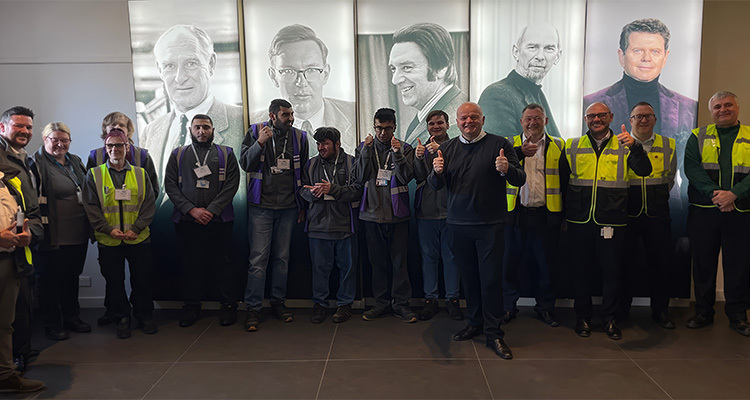People-led, single source supplier of assembled automotive products, Evtec Automotive, is leading the industry toward a more sustainable and inclusive future
Since we last sat down with Evtec Automotive, the company has overcome strains on its supply chain and taken major steps toward more sustainable industry. As Group Chairman, David Roberts, reports: “We faced some challenges, especially when there was a shortage of semi-chip conductors. I think everyone saw that in the supply chain, and it certainly had an impact for us. But, thanks to our team, the business was able to come out the other side of the shortage relatively unscathed. And we’ve had a complete bounce back since then. We’re now operating at pre-pandemic levels, which is a huge relief.
“It’s been a long journey, but we’re very proud that we’ve been able to come out the other side. Our revenues in 2023 were up to just over 30 percent year-on-year, which was great to see. We’ve had fantastic demand for our top three cars, the Range Rover, the Sport and the Defender. Additionally, in 2022, we bought in another company under the Evtec banner. That makes three businesses that have become part of our operation, with four locations and about 800 employees. In total our sales revenue sits at around £150 million.
which was great to see. We’ve had fantastic demand for our top three cars, the Range Rover, the Sport and the Defender. Additionally, in 2022, we bought in another company under the Evtec banner. That makes three businesses that have become part of our operation, with four locations and about 800 employees. In total our sales revenue sits at around £150 million.
“The reason we underwent another acquisition is to support our contract with JLR. We supply several big-name car manufacturers, including Bentley, Aston, and McLaren, so the additional capacity was also very useful in supporting those partnerships. Our contract with JLR catalyzed the process of bringing another company into the mix, as we not only needed to increase our output, but also start diversifying our range. Specifically, JLR was planning a move from ICE vehicle platforms to zero-emission vehicle platforms. Initially, they wanted hybrid technology, with the aim of moving into all-electric components further down the line.
“We’re in the business of completing super lightweight assemblies. Our components use aluminum as their primary material, and one-third of that is recycled. That goes to show we were already thinking and operating sustainably. Now, thanks to our work with JLR and the shift toward hybrid and electronic components, we are one of the main suppliers for EMA, the electric vehicle platform. Our goal is to work on all its future models and become a leader in the EV space.”
Manufacturing with sustainably sourced materials has helped Evtec establish itself in the electric vehicle space, as David discusses: “Going back 20 years, none of the established OEMs would use recycled material, especially aluminum, in any of their vehicles. But as we’ve come to understand how industry impacts the environment, and refined the recycling process, that sentiment has changed. Reusability has been at the forefront of our sourcing strategy for at least the last five years. About one third of our business now uses recycled aluminum, acquired through third-party sources. These third parties will undertake all the necessary metallurgical tests on the material, as well as quality standard assessments, so by the time it reaches us we know it’s fit for purpose.
 “What’s particularly interesting is that we’ve already got enough aluminum to last us forever. We don’t need more; we need to make better use of what we do have. If we continue to recycle the material effectively, we won’t need to produce more. Our product, the LM24, is a small step in the larger movement toward sustainable material production and circulation.
“What’s particularly interesting is that we’ve already got enough aluminum to last us forever. We don’t need more; we need to make better use of what we do have. If we continue to recycle the material effectively, we won’t need to produce more. Our product, the LM24, is a small step in the larger movement toward sustainable material production and circulation.
“Sustainability has become a key driver in everything we do. Some companies are effectively greenwashing their brand, paying lip service to environmental consciousness without truly following through on those promises. Evtec does the opposite of that. Our sustainable practices are not part of our external branding, so much as they are a part of our internal operations and, to a large extent, our daily lives. We don’t always publish it, but we always practice it.”
Sustainable practice supports the future of industry, but Evtec is also ahead of the curve when it comes to creating a working culture fit for the next generation. “We’re very aware that there is a labor shortage in the UK, especially in the manufacturing sector. To tackle this issue, we’ve put a number of preventative measures in place. Firstly, we wanted to address the fact that the automotive industry has a reputation for being male dominated. We want to bring talented, interested young people into the business regardless of gender, so it was important to us that we challenge this perception. We have lots of talented women on our team, and we’ve made a conscious effort to ensure our working culture is inclusive for everybody. Additionally, we’ve made the working environment more flexible and attractive. If you’re working 30-to-40 hours a week somewhere, it should be more than just a job. We provide emotional and mental support for all our employees, as well as excellent facilities. Our canteen provides freshly made, well balanced hot meals every day. We’re protecting our people, and in turn they act as our pioneers,” David concludes. ■
